by Charles on August 5, 2009

“Pop Tarts for breakfast? Think again. After reviewing the ingredient list and the overall nutritional content of these things (I will not even call them a food) I realized they are pure junk!”
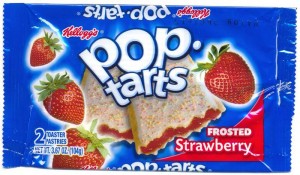
In this post:
1. A mother says no to Pop Tarts;
2. Another mother fights junk food AND her child’s school;
3. A parents’ organization dedicated to fighting junk food;
4. Sadly (sigh…), Doctors that pass out candy
1. Lisa, whom we quoted above, is a former personal trainer who is discovering the connection between what goes into your body and how your body subsequently looks and functions (or fails to). As a parent, she has slipped away from the regular rigors of working out and writes a beautifully presented blog called Workout Mommy as a means of personal motivation and to motivate others. Cool, that!
She recently read the ingredients from a Pop Tarts box, and here is where it gets fun. She titles her post “Pop Tarts for Breakfast? Think Again!” Though both she and her son “like” Pop Tarts (confession, so do I, but have not touched them in 25 years) she has taken them off the menu of her home. She says: “These are not for breakfast nor are they for a snack! They are essentially a giant candy bar, filled with sugar and sodium. The only place these should go is in the trash! So repeat after me: No more Pop-Tarts!” Read more...
by Charles on August 3, 2009

A recent study turns conventional thinking on its head. Low carb diets can cut or eliminate the need for diabetic drugs. It associates healthy fats with decreases in cardiovascular disease. Good news for diabetics; bad news for big pharma and dietary dictocrats.

The study is called “Dietary carbohydrate restriction in type 2 diabetes mellitus and metabolic syndrome: time for a critical appraisal.” It’s a mouthful that carries several profound messages. The findings:
1. Carbohydrate restriction improves glycemic control, the primary target of nutritional therapy and reduces insulin fluctuations.
2. Carbohydrate-restricted diets are at least as effective for weight loss as low fat diets.
3. Substitution of fat for carbohydrate is generally beneficial for markers for and incidence of cardiovascular disease.
4. Carbohydrate restriction improves the features of metabolic syndrome.
5. Beneficial effects of carbohydrate restriction do not require weight loss.
So what led to this study in the first place? The intransigence of the American Diabetic Association and their like. The study authors explain: Read more...
by Charles on July 29, 2009

The pharmaceutical industry gets rich making drugs that “manage” rather than “heal” disease. But a licensed M.D. had astounding success with real healing using a simple food substance from nature: Grass-fed Raw Milk. He wrote a book about his work. Another man, a nutritionist, healed himself using the milk diet and went on to build upon and modify it.
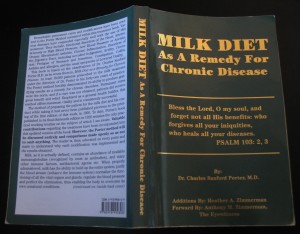
Milk Diet As A Remedy For Chronic Disease by Charles Sanford Porter, M.D
First, do no harm. Dr. Charles Porter practiced medicine at the turn of the 20th Century. He took to heart the words in the Hippocratic Oath “to obstain from doing harm.” We know these words better as “First, do no harm.” This phrase reminds us of another popular one: “sometimes the cure is worse than the disease.” The problem with this latter phrase today is that modern medical cures don’t typically cure but only manage the disease so one can live more comfortably and perhaps with it: diabetes, heart disease, cancer, etc. But the dictionary definition of “heal” is “to make healthy, whole, or sound; restore to health; free from ailment.” Free from ailment. Our modern drugs don’t, as a rule, free us from ailments; they modify symptoms: i.e. blood pressure, etc. But once one stops taking the ‘medication” the effect stops too. So one is not healed of the problem for which the drug is taken. Worse, the side effects can include possible damage to the organs. If you have never looked through the Physicians Desk Reference, do so. Take a look at the possible side effects for any drug. It is not a small matter. However, a rarely mentioned side effect of most every drug is that of nutrient depletion. These drugs do not just go in and do their job; they tend to deplete the body of nutrients — vitamins, minerals, etc. Now how is it possible to heal the body while depleting it of nutrients? “Do no harm”?
Read more...
by Charles on July 24, 2009

In a recent post, Want Real Health? Real Food Is the Key, we defined “real health” and made the connection between real health and real food. Today we offer you some specific guidelines on how to choose real foods, not fake foods.
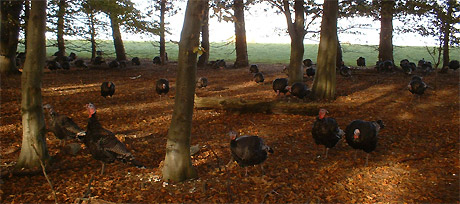 The guidelines offered herein are based on the findings of Weston Price. Weston Price was a dentist who traveled the world in the 1920’s and 30’s in search of the dietary practices of those native peoples with perfect teeth and mouth formations. He concluded that the health of the mouth is a window into the health of the rest of the body and that the key to good dental health is a real food diet. Though certain specifics of native diets differed one from the other, there were many common characteristics and it is those we are posting today. More information is available at http://www.westonaprice.org/. Read more...
The guidelines offered herein are based on the findings of Weston Price. Weston Price was a dentist who traveled the world in the 1920’s and 30’s in search of the dietary practices of those native peoples with perfect teeth and mouth formations. He concluded that the health of the mouth is a window into the health of the rest of the body and that the key to good dental health is a real food diet. Though certain specifics of native diets differed one from the other, there were many common characteristics and it is those we are posting today. More information is available at http://www.westonaprice.org/. Read more...
by Charles on July 14, 2009

It’s Summer. Are you hiding from the sun? If so, you are missing out on the all important nutrient Vitamin D which has been so much in the news lately.
 It is critical to maintaining good health and can be very helpful in healing a variety of ailments. Perhaps then, you should be at least as afraid of Vitamin D deficiency as you are of getting some good sunshine. Herein, a primer: everything you always wanted to know about what Vitamin D can do for you. Following the riveting post on Child Abuse? or Vitamin D Deficiency Rickets, we offer a guide to using Vitamin D. Courtesy of the Vitamin D Council.
It is critical to maintaining good health and can be very helpful in healing a variety of ailments. Perhaps then, you should be at least as afraid of Vitamin D deficiency as you are of getting some good sunshine. Herein, a primer: everything you always wanted to know about what Vitamin D can do for you. Following the riveting post on Child Abuse? or Vitamin D Deficiency Rickets, we offer a guide to using Vitamin D. Courtesy of the Vitamin D Council.
This is a very long newsletter. I will answer questions about oil versus water-soluble Vitamin D, depression, mental clarity, malignant melanoma, Crohn’s disease, an imagist poet, multiple sclerosis, sun-exposure, high-intensity red light and collagen repair in the skin, non-alcoholic fatty liver disease, influenza, the 1918 influenza pandemic, statins, the new Food and Nutrition Board, thyroid disease, chronic fatigue syndrome, athletes, the upcoming 14th Vitamin D Workshop, prostate cancer, the wrong blood test, pregnancy, autism, Alzheimer’s disease, soap and sebum, asthma, sleep, the co-factors vitamin D needs to work (all contained in spinach), and—my favorite—UVC light and Vitamin D. Read more...
by Charles on June 24, 2009

What is REAL FOOD? Let’s begin with an understanding of what we mean when we say “real food.” For our definition I am borrowing from CHEESESLAVE on her page, here.
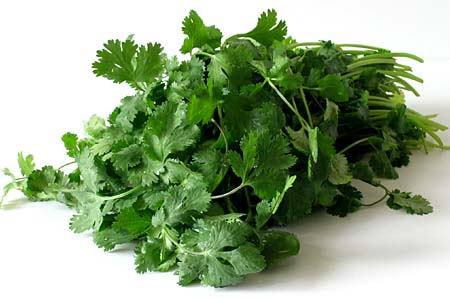
“Real food is whole, natural, and nutrient-dense.
* Organic
* Humanely raised (animals on pasture, not in factories)
* Grown locally when possible
* Whole and unrefined (real maple syrup instead of high-fructose corn syrup)
* Processed as little as possible (raw milk instead of pasteurized and homogenized)
* Nutrient-dense (enzymes, vitamins, minerals, and probiotics)
* Free of additives and preservatives
* Free of synthetic and chemical ingredients
* Not genetically modified
* Traditionally produced and prepared
In other words, butter or lard instead of shortening or vegetable oil. Real milk from a cow instead of soy milk. Real sprouted flour (ground fresh or purchased) instead of refined white flour. Real, natural sweeteners like honey or unrefined cane sugar (rapadura or sucanat) instead of white sugar.
If it’s highly processed and/or doesn’t come from nature, it’s not real food!”
OK now that we have an understanding of real food:
What is REAL HEALTH?
Read more...
by Charles on June 19, 2009

Once upon a time dietary fat was healthy and good people everywhere ate the good foods that nature provided and they loved. Then, government dictocrats labeled it unhealthy and an obesity epidemic ensued. But now…
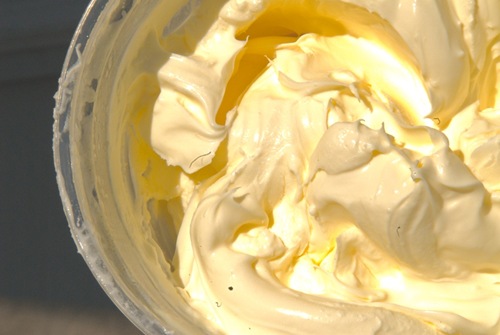 …it is healthy again and there is a ton of science from all over the world to back it up! It’s time to start ENJOYING HEALTHY FAT AGAIN! If you have been waiting for good news about dietary fat you need wait no longer. Ode Magazine has published in the June/July 2009 issue the ultimate article, well researched, detailed and highly readeable packed with good news for those of you who love your fat! Of course if you know anything about Weston Price then this will be old news to you; but what’s exciting about this article is that it shows how the tide of opinion, both popular and scientific, has turned dramatically in favor of dietary fat.
…it is healthy again and there is a ton of science from all over the world to back it up! It’s time to start ENJOYING HEALTHY FAT AGAIN! If you have been waiting for good news about dietary fat you need wait no longer. Ode Magazine has published in the June/July 2009 issue the ultimate article, well researched, detailed and highly readeable packed with good news for those of you who love your fat! Of course if you know anything about Weston Price then this will be old news to you; but what’s exciting about this article is that it shows how the tide of opinion, both popular and scientific, has turned dramatically in favor of dietary fat.
It is packed with quotable, memorable lines. Here is a sampling:
–“Regularly described as the nutritional equivalent of cigarettes, fat has been the target of public-service campaigns and municipal bans aimed at keeping us slender and healthy. But a growing body of international research suggests our obsessive fear of fat may be misplaced. A high-fat diet won’t necessarily make us sick or fat; a low-fat diet may not make us healthy or slim.“
Read more...



 The guidelines offered herein are based on the findings of Weston Price. Weston Price was a dentist who traveled the world in the 1920’s and 30’s in search of the dietary practices of those native peoples with perfect teeth and mouth formations. He concluded that the health of the mouth is a window into the health of the rest of the body and that the key to good dental health is a real food diet. Though certain specifics of native diets differed one from the other, there were many common characteristics and it is those we are posting today. More information is available at
The guidelines offered herein are based on the findings of Weston Price. Weston Price was a dentist who traveled the world in the 1920’s and 30’s in search of the dietary practices of those native peoples with perfect teeth and mouth formations. He concluded that the health of the mouth is a window into the health of the rest of the body and that the key to good dental health is a real food diet. Though certain specifics of native diets differed one from the other, there were many common characteristics and it is those we are posting today. More information is available at 

 …it is healthy again and there is a ton of science from all over the world to back it up! It’s time to start ENJOYING HEALTHY FAT AGAIN! If you have been waiting for good news about dietary fat you need wait no longer.
…it is healthy again and there is a ton of science from all over the world to back it up! It’s time to start ENJOYING HEALTHY FAT AGAIN! If you have been waiting for good news about dietary fat you need wait no longer. 